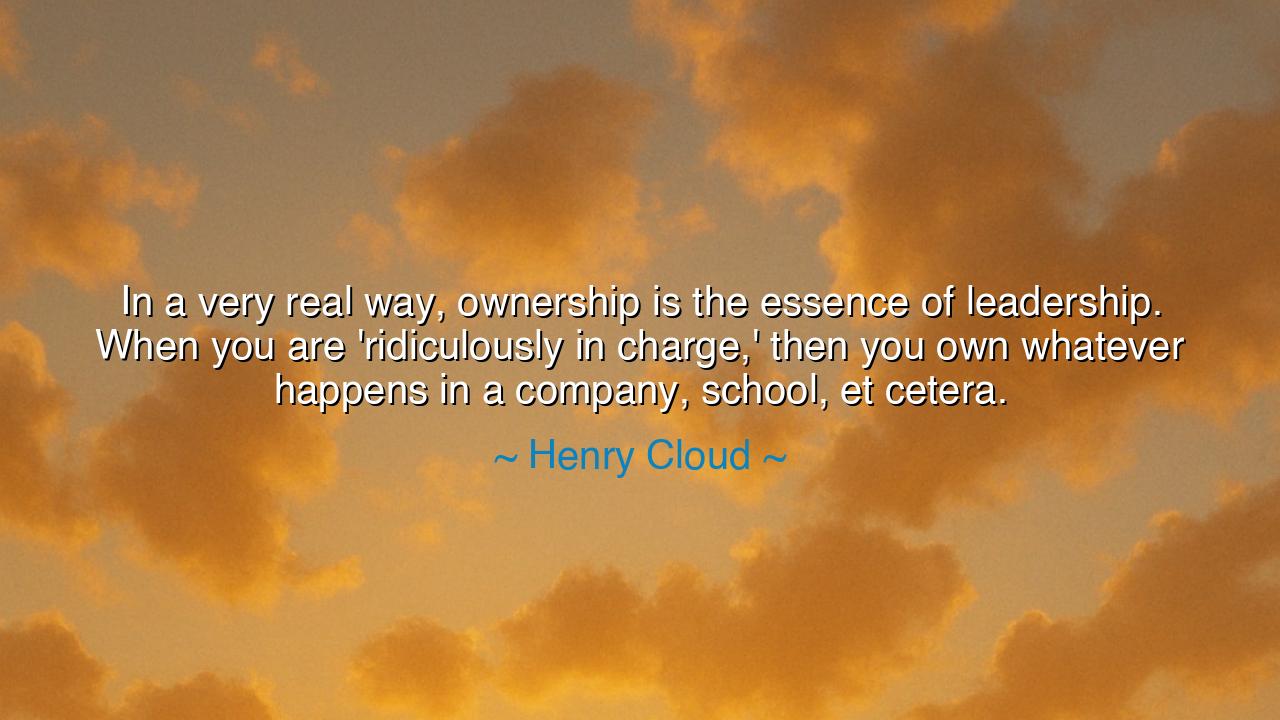
In a very real way, ownership is the essence of leadership. When
In a very real way, ownership is the essence of leadership. When you are 'ridiculously in charge,' then you own whatever happens in a company, school, et cetera.






Hear now the words of Henry Cloud, who in his wisdom declared: “In a very real way, ownership is the essence of leadership. When you are ‘ridiculously in charge,’ then you own whatever happens in a company, school, et cetera.” In this teaching lies a truth as old as the rise of kingdoms and the building of civilizations—that leadership is not the seat of privilege, but the mantle of ownership. To lead is to stand responsible for all, to carry the weight of failures and triumphs alike, and to never turn away from the burdens entrusted to your hands.
For many crave authority without responsibility. They delight in the crown but shrink from the cross. Yet Cloud reminds us that true leadership is not the exercise of power for comfort, but the acceptance of ownership for everything that unfolds under your charge. To be “ridiculously in charge” means that excuses are silenced, blame is rejected, and the leader says always: If this has happened on my watch, then it is mine to bear, and mine to set right.
The ancients gave us examples. Consider Marcus Aurelius, emperor of Rome. When plague ravaged his empire and war pressed on its borders, he did not hide behind generals or priests. He bore the weight of decisions himself, writing in his Meditations that the ruler must take upon his shoulders the suffering of his people, never seeking to escape responsibility. Though he might have claimed fate or fortune, he embraced ownership, and in doing so embodied the essence of true leadership.
Contrast this with leaders who failed. When the city of Constantinople fell in 1453, its emperor Constantine XI fought and died with his soldiers, taking ownership to the very end. But in many other collapses of states, leaders fled, abandoned their people, or blamed others for ruin. History remembers them not with honor but with scorn, for to reject responsibility is to betray leadership itself. Thus Cloud’s words ring like judgment: without ownership, leadership is hollow and false.
The deeper meaning of this teaching is that ownership is the soul of trust. Followers look not for perfection in their leaders, but for the assurance that their leader will not abandon them when storms arise. When the captain of a ship owns both safe passage and wreck alike, the crew will follow him even into fire. But when he shifts blame or shrinks from his duty, trust is shattered, and the ship drifts leaderless. Ownership, then, is not only responsibility—it is the very foundation of loyalty, courage, and unity.
The lesson for us is clear: if you would lead, embrace ownership completely. Do not excuse yourself when failures come; take them as your own, learn from them, and set the course anew. Do not point the finger at your team, your circumstances, or your rivals. Leadership demands that you say always, This is mine, and I will see it through. In this way you not only grow in strength, but you inspire others to rise with you.
Practical action flows from this wisdom: in your work, if errors arise, claim them and correct them rather than hiding. In your family, take responsibility for the harmony of the home. In your community, if something is broken, be the one to step forward and repair it. Train yourself to think not, Who is to blame? but, What can I do? For in this lies the heart of Cloud’s teaching: leadership is ownership.
So remember always: to be “ridiculously in charge” is not to revel in power, but to embrace the burden of responsibility. Own what happens under your watch, and you will earn the trust, loyalty, and respect of those who follow. Flee ownership, and all authority crumbles into dust. For in every age, the leader remembered is the one who stood firm and said: The fate of my people is mine to bear.






AAdministratorAdministrator
Welcome, honored guests. Please leave a comment, we will respond soon